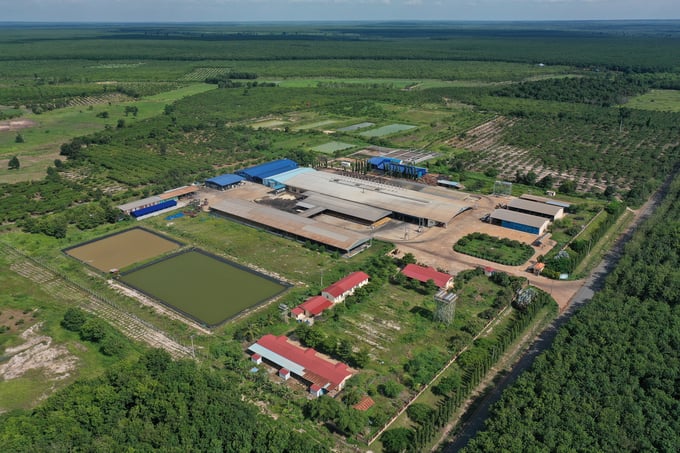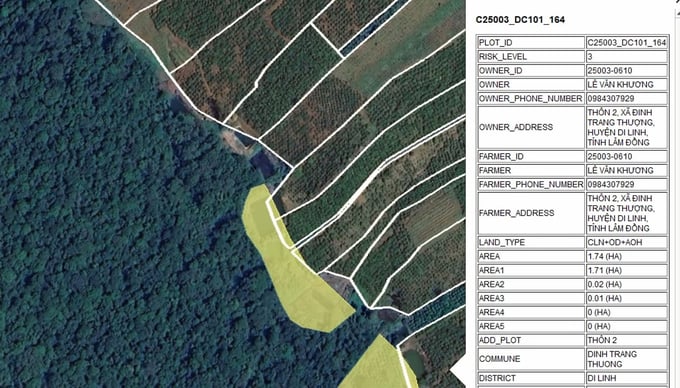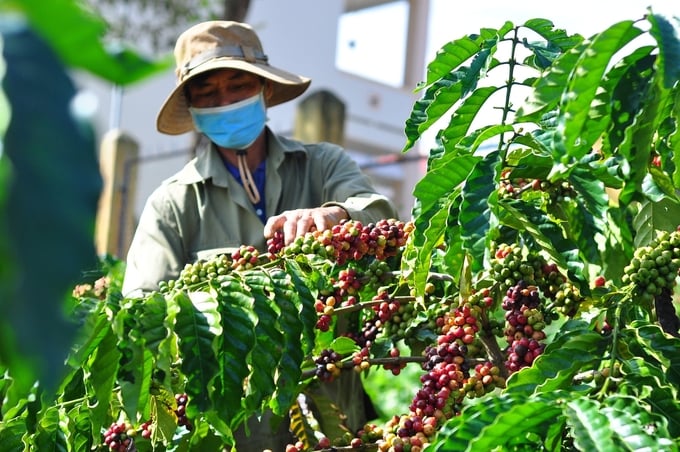November 19, 2025 | 12:44 GMT +7
November 19, 2025 | 12:44 GMT +7
Hotline: 0913.378.918
November 19, 2025 | 12:44 GMT +7
Hotline: 0913.378.918

Vietnam strives to become a country with a “low risk” of deforestation. Photo: Tung Dinh.
The European Union Deforestation Regulation (EUDR) is among the most significant environmental policies in recent years, promoting deforestation-free agricultural trade. Since its introduction, Vietnam has prioritized building a comprehensive and reliable data system to track the origins of agricultural products, recognizing this as a critical element for declarations to European markets. The country aims to achieve a “low-risk” classification for deforestation, which would allow for simplified assessment procedures.
Despite resistance and recommendations for adjustments from major exporting countries, the European Union announced at the end of 2024 a one-year delay in the EUDR’s implementation. Under the revised timeline, large enterprises and operators have until December 30, 2025, to comply fully with the regulation, while small and micro enterprises have an extended deadline of June 30, 2026.
However, Vietnam has not slowed its efforts. “With a proactive and positive approach, the Ministry of Agriculture and Rural Development and local authorities have not waited for the EUDR delay,” said Dr. Nguyen Do Anh Tuan, Director General of the International Cooperation Department (MARD). “We have consistently disseminated information and organized technical training sessions for businesses, associations, localities, and especially farmers, to ensure that Vietnamese agricultural products fully meet traceability requirements.”
Vietnam remains consistent in promoting modern agriculture. On various international platforms, the MARD has praised the EUDR as a driver for Vietnam's agricultural strategy, which emphasizes transparency, accountability, sustainability, and green growth.
Implementing the EUDR, however, requires extensive cross-sectoral collaboration. If just one of the seven regulated sectors – livestock, cocoa, coffee, palm oil, rubber, soybeans, and timber – is classified as “high risk,” the entire agricultural sector of a country could face heightened scrutiny.

The EUDR Adaptation Partnership Group has collected data for more than 260,000 hectares of forest and coffee in the Central Highlands. Photo: IDH.
In the initial phase of the EUDR Adaptation Action Plan, Vietnam identified its most significant challenges: the absence of comprehensive information systems, plantation location data, and forest maps that align with the EUDR’s cutoff date of December 31, 2020. Furthermore, it was necessary to establish mechanisms to safeguard the livelihoods of 600,000 small- and micro-scale farming households, many of whom cultivate on forestry land or near forested areas.
After more than a year of fostering public-private partnerships from central to local levels, Vietnam achieved a significant milestone in December 2024 with the official launch of an EUDR-compliant database system for forest and coffee-growing areas. The EUDR Adaptation Partnership Group collected data on 130,000 hectares of forest and 136,000 hectares of coffee plantations across four key coffee-producing districts in Lam Dong and Dak Lak provinces.
These proactive efforts have garnered recognition from the European Union (EU) Delegation, which views Vietnam as a leader in sustainable agricultural development. “Vietnam is on the right track in implementing EUDR regulations. Compliance with these regulations will provide Vietnamese enterprises with a competitive edge in exporting to other high-standard markets,” said Ms. Mara Grimminger, a representative of the International Media Agency within the EU’s General Department of Environment.
In early December 2024, the Vietnam Rubber Industry Group (VRG) hosted a ceremony to announce its progress in adapting to EUDR requirements. To date, three member companies of VRG – Dong Nai Rubber Corporation, Dau Tieng Rubber One Member Co., Ltd., and Chu Se Kampong Thom Rubber Joint Stock Company (Cambodia) – have successfully met EUDR compliance standards, earning acceptance from their international customers.
Mr. Huynh Tan Sieu, Head of the Industry Department at VRG, attributed this achievement to the group’s long-standing commitment to sustainable forest management. “Our dedication to sustainability over the years has positioned us to adapt effectively to the EUDR, setting a strong example for other sectors in Vietnam,” he remarked.
Not only the rubber industry, but also the coffee industry is ready for the EUDR. As a leading unit in the coffee industry in Vietnam and co-chair of the Partnership for Sustainable Agriculture in Vietnam (PSAV), Nestlé Vietnam has actively coordinated to address challenges related to deforestation-free coffee production.

Nestlé Vietnam agrees with the orientation of putting people at the center of Vietnam's green transition. Photo: Minh Hau.
Mr. Binu Jacobs - General Director of Nestlé Vietnam commented that the Vietnamese coffee industry has continuously improved quality and traceability. Despite the delay in the implementation of the EUDR, these efforts will continue in 2025.
Another important area is responsible sourcing. Nestlé Vietnam works closely with suppliers and certification bodies such as 4C and Rainforest Alliance to ensure that agricultural ingredients meet sustainability standards.
In addition, significant investment has been made in research and development (R&D) to promote sustainable agriculture. Nestlé Vietnam not only improves crop yields but also reduces environmental impacts, while developing flexible farming systems that are better adapted to climate change.
“These initiatives will transform Vietnam into a hub for supplying green, sustainable and low-emission agricultural products. This will help attract more green investors and contribute to the commitment to achieving net zero emissions by 2050,” Mr. Jacob assessed.
Translated by Quynh Chi

(VAN) Deputy Prime Minister Tran Hong Ha convened a meeting with the MAE and relevant agencies to discuss the draft decree on national multidimensional poverty standards for the 2026 - 2030 period.

(VAN) The year 2025 marks the 10th anniversary since more than 190 countries adopted the Paris Agreement on climate change, paving the way for strengthened global action.

(VAN) The PepsiCo Foundation funded the project ‘New Harvest: Sustainable Agriculture Initiative’, focusing on regenerative agriculture and climate change.

(VAN) Dr. Nguyen Viet Hung, ILRI's Regional Director for Asia, emphasized the One Health approach in ensuring food safety and reducing antimicrobial resistance risks in livestock.

(VAN) The youth-driven initiative ‘Innovate for water, act for the future’ seeks practical, scalable solutions to Vietnam’s water challenges.

(VAN) At the Annual Science Conference of Thuyloi University, Deputy Minister Phung Duc Tien directed researchers to focus on in-depth studies, data harmonization, and solutions linked to real-world practice.

(VAN) After nearly four years of implementation, 5,187 community agricultural extension groups have been established nationwide, with 47,493 members participating.